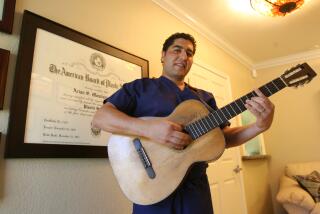Lap-Band clinic sued over death
A fourth Southern California patient has died following Lap-Band weight-loss surgery at a clinic connected to the pervasive 1-800-GET-THIN advertising campaign, according to a lawsuit filed by the patient’s husband.
Laura Faitro of Simi Valley died July 26, 2010, five days after surgery at Valley Surgical Center in West Hills. Three other patients have died shortly after surgery at an associated center in Beverly Hills, relatives have alleged in lawsuits and interviews.
FOR THE RECORD: Los Angeles Times Friday, March 25, 2011 Home Edition Main News Part A Page 4 News Desk 6 inches; 218 words Type of Material: CorrectionLap-Band lawsuits: A Business article that appeared online Feb. 10 and in print Feb. 11 about lawsuits filed against marketing company 1-800-GET-THIN reported that the Medical Board of California, in revoking Julian Omidi’s license to practice medicine, accused him of failing to disclose that he had attended UC Irvine, which expelled him in 1990, and that he pleaded guilty to commercial burglary in Orange County in 1991. Both of these accusations were made by the board, but a subsequent court proceeding found that Omidi reasonably relied on the advice of his attorneys in failing to disclose the burglary conviction, which was dismissed after he completed probation and community service. In its final order revoking Omidi’s license, the medical board included references to the burglary for “historical context,” but the revocation itself was based on Omidi’s failure to disclose his attendance at UCI. The article also reported that in a separate action the Medical Board of California accused Julian Omidi’s brother, Dr. Michael Omidi, of being “grossly negligent” in the treatment of three liposuction patients. The board did make that accusation, but Omidi settled the case by agreeing that he had violated state law by performing surgeries on three patients at an unaccredited surgical facility. The board revoked Michael Omidi’s license but stayed that action for three years’ probation.
Prospective patients are referred to surgery clinics after calling a toll-free number that is advertised on Southern California billboards, buses, on television and through direct mail, said Robert Silverman, an attorney who represents the two clinics and 1-800-GET-THIN, which advertises on Southern California billboards, buses, on television and through direct mail. The Lap-Band is a silicone ring that is surgically fitted over part of the stomach to discourage overeating.
Faitro, 50, was in intense pain after the July 21 surgery and sought follow-up treatment at Simi Valley Hospital, where she died, said her husband, John Faitro. He filed a medical malpractice and wrongful death lawsuit Feb. 3 against surgeons Ihsan Shamaan and Kevork George Tashjian, 1-800-GET-THIN, Valley Surgical Center, Simi Valley Hospital and doctors who treated her there.
Faitro’s liver was lacerated three times during the Lap-Band procedure at Valley Surgical Center, but she was discharged from the surgery center several hours later without being informed of the injury, according to the lawsuit. Faitro’s death certificate lists heart failure as the cause of death, with liver laceration and morbid obesity as contributing factors.
An autopsy report said Faitro had more than 3 liters of bloody fluid in her abdominal cavity. Before her death, doctors at Simi Valley Hospital had diagnosed her with sepsis, a bacterial infection of the bloodstream, in her abdomen, according to the autopsy report last year by the Ventura County coroner. She had been treated with antibiotics, the report said.
In an interview, John Faitro said he was upset that the surgeons at Valley Surgical Center did not tell his wife that her liver had been lacerated during the Lap-Band procedure. He said he is blind, diabetic and a kidney dialysis patient, and that his wife was his principal caretaker.
“They took my wife away and they keep doing these surgeries like nothing happened,” he said. “If they would have just told me [that her liver had been cut] I would have called the paramedics.”
Silverman blamed Faitro’s death on advanced heart disease and the care she received at Simi Valley Hospital after the surgery. He said the Lap-Band device was properly implanted.
“There is no reason to comment on the liver laceration as it was not a cause of death,” Silverman said in an e-mail statement.
He continued, “It would appear that Ms. Faitro died of non-Lap Band related issues due to her extremely poor overall health condition.”
Faitro’s surgeons, Shamaan and Tashjian, could not be reached for comment. A spokeswoman for Simi Valley Hospital declined to discuss the lawsuit.
John Faitro said his wife, who was 5 feet 6 and weighed about 250 pounds, began gaining weight 25 years ago when he lost his eyesight from diabetes. “She was a stressful eater. She loved tacos and sometimes ice cream,” he said.
She had been looking forward to the surgery for months, her husband said.
“She thought it would be so awesome, just to put on clothes off the rack in the store. She wanted to work out with me. When you get big it’s hard to work out,” John Faitro said. “It was hard for her to go for walks. She thought she’d be able to do it a lot easier, have a lot more energy.”
Three other Lap-Band patients -- Ana Renteria, 33, of Norwalk; Tamara Walter, 52, of Lawndale; and Willie Brooks, 35, of Perris -- have died in the last two years, all shortly after undergoing implantation surgery at a clinic on Wilshire Boulevard in Beverly Hills. The Medical Board of California is investigating the care that surgeon Atul Madan provided to Renteria and Walter, according to correspondence from the medical board to relatives of the two women.
Those deaths have also prompted legal action. Renteria’s family last week filed a lawsuit accusing Madan, the 1-800-GET-THIN marketing company and others of contributing to her death. Last year, Brooks’ family sued the clinic owners and surgeon Tashjian, who also helped perform Faitro’s surgery. The Brooks lawsuit is scheduled to go to trial in June. Tashjian and other defendants have denied wrongdoing.
Relatives of Renteria and Faitro filed an additional lawsuit Feb. 4 against 1-800-GET-THIN claiming that its ad campaign was misleading. The lawsuit seeks class-action status. The families accused the marketing company of false advertising for allegedly failing to provide adequate warnings about the risk of the surgery and for failing to tell patients that the clinics were operated by two brothers, Julian and Michael Omidi, who had been accused of misconduct by the state medical board.
The medical board revoked Julian Omidi’s license to practice on June 19, 2009, citing his “penchant for dishonesty.” A medical board accusation said Omidi had failed to disclose on his medical license application that he had attended UC Irvine, which expelled him in 1990 for participating in the theft of exams. The medical board also accused him of failing to disclose that he had pleaded guilty to commercial burglary in Orange County in 1991. That burglary conviction was dismissed at Omidi’s request in 2006.
The medical board placed Michael Omidi on three years’ probation in 2008. The board had filed an accusation that said he was “grossly negligent” in the treatment of three liposuction patients.
John Faitro said that he didn’t learn about the Omidi brothers’ history until after his wife’s death.
“We had no idea,” John Faitro said. “I would have told her immediately, ‘Don’t do that. Let’s go someplace else.’ ”
Alexander Robertson IV and John M. Walker, attorneys who are representing the Renteria and Faitro families, said in an interview that the upbeat marketing campaign -- “Let your new life begin, call 1-800-GET-THIN” -- was deceptive because it minimized the risks of the surgery.
“When you listen to a very cute jingle it sounds like this is going to be an easy fix for a serious medical problem. At least for two of our clients, it wasn’t a quick fix. There were complications that took their lives,” Walker said.
Silverman, the lawyer who represents 1-800-GET-THIN and the two clinics, said the advertisements include warnings about the risks of surgery. He said the lawsuits were without merit.
“Each lawsuit contains knowingly false statements and appear to be only included in the lawsuit to gain publicity for the plaintiffs and notoriety for the lawyers,” Silverman said.
“My clients have helped thousands of individuals achieve weight loss for which diet and exercise or any other product failed,” he said. “These individuals and society are better served when these individuals lose significant weight.”
John Faitro, 53, said he sued to send a message to the public that the surgery carries risk. He said friends from his church now perform tasks that were once his wife’s, taking him to dialysis appointments and handling his insulin pump. He voice trembled as he talked about how much he missed his wife.
“I know she’s with God right now and I’ll see her when God takes me home,” Faitro said. “But down here I miss her. Every day of my life.”
More to Read
Sign up for Essential California
The most important California stories and recommendations in your inbox every morning.
You may occasionally receive promotional content from the Los Angeles Times.











